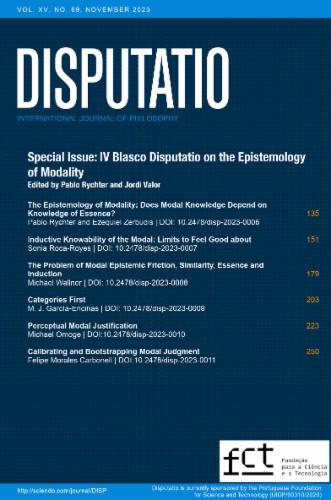[
Aaby, Bendik Hellem & Ramsey, Grant [2022]. “Three kinds of niche construction”. The British Journal for the Philosophy of Science 73: 351–72.
]Search in Google Scholar
[
Chow, J. Sheldon [2013]. “What’s the problem with the frame problem?”. Review of Philosophy and Psychology 4: 309–31.
]Search in Google Scholar
[
Dennett, Daniel [1987]. “Cognitive wheels: the frame problem of AI”. In The Robot’s Dilemma: The Frame Problem in Artificial Intelligence, edited by Zenon Pylyshyn. Norwood, NJ: Ablex Publishing.
]Search in Google Scholar
[
Dohrn, Daniel [2017]. “Nobody bodily knows possibility”. Journal of Philosophy 114: 678–86.
]Search in Google Scholar
[
Fischer, Bob [2017]. “Modal empiricism: Objection, reply, proposal”. in Modal Epistemology After Rationalism, edited by Bob Fischer & Felipe Leon. Cham: Springer: 263–80.
]Search in Google Scholar
[
Haugeland, John [2017]. “Two dogmas of rationalism”. In Giving a Damn: Essays in Dialogue with John Haugeland, edited by Zed Adams & Jacob Browning. Cambridge, MA: The MIT Press: 293–310.
]Search in Google Scholar
[
Humphreys, Paul [2004]. Extending Ourselves: Computational Science, Empiricism and Scientific Method. Oxford: Oxford University Press.
]Search in Google Scholar
[
Johnson-Laird, N. Philip [1987]. “Reasoning, imagining, and creating”. Bulletin of the British Psychological Society 40: 121–9.
]Search in Google Scholar
[
Johnson-Laird, N. Philip [2002]. “How Jazz musicians improvise. Music Perception: An Interdisciplinary Journal 19: 415–42.
]Search in Google Scholar
[
Johnson-Laird, N. Philip [2009]. How We Reason. Oxford: Oxford University Press.
]Search in Google Scholar
[
Knuth, Donald [1997]. The Art of Computer Programming, Vol I: Fundamental Algorithms, 3rd edition. Reading, MA: Addison Wesley.
]Search in Google Scholar
[
Kocurek, W. Alexander [2021]. “Counterpossibles”. Philosophy Compass 16: e12787.
]Search in Google Scholar
[
Kroedel, Thomas [2017]. “Modal knowledge, evolution, and counterfactuals”. In Modal Epistemology After Rationalism, edited by Bob Fischer & Felipe Leon. Cham: Springer: 179–196.
]Search in Google Scholar
[
Martinez, Manolo [2015]. “Modalizing mechanisms”. Journal of Philosophy 112: 658–70.
]Search in Google Scholar
[
Millar, Alan [2019]. Knowing By Perceiving. Oxford: Oxford University Press.
]Search in Google Scholar
[
Neurath, Otto [1959]. “Protocol sentences”. In Logical Positivism, edited by A.J. Ayer. New York: Free Press; 199–208.
]Search in Google Scholar
[
Nolan, Daniel [2017]. “Naturalised modal epistemology”. In Modal Epistemology After Rationalism, edited by Bob Fischer & Felipe Leon. Cham: Springer: 7–28.
]Search in Google Scholar
[
Roca-Royes, Sonia [2011]. “Modal knowledge and counterfactual knowledge”. Logique et Analyse 54: 537–52.
]Search in Google Scholar
[
Roca-Royes, Sonia [2012]. “Essentialist blindness would not preclude counterfactual knowledge”. Philosophia Scientiae 16: 149–72.
]Search in Google Scholar
[
Sher, Gila [2010]. “Epistemic friction: Reflections on knowledge, truth and knowledge”. Erkenntnis 72: 151–76.
]Search in Google Scholar
[
Sher, Gila [2016]. Epistemic Friction: An Essay on Knowledge, Truth, and Logic. Oxford: Oxford University Press.
]Search in Google Scholar
[
Sterelny, Kim [2003]. Thought in a Hostile World: The Evolution of Human Cognition. Oxford: Routledge.
]Search in Google Scholar
[
Sterelny, Kim [2010]. “Minds: Extended or scaffolded?”. Phenomenology and the Cognitive Sciences 9: 465–81.
]Search in Google Scholar
[
Strohminger, Margot. [2015]. “Perceptual knowledge of nonactual possibilities”. Philosophical Perspectives, Epistemology 29: 363–75.
]Search in Google Scholar
[
Strohminger, Margot & Yli-Vakkuri, Juhani [2019]. “Knowledge of objective modality”. Philosophical Studies 176: 1155–75.
]Search in Google Scholar
[
Tahko, Tuomas [2012]. “Counterfactuals and modal epistemology”. Grazer Philosophische Studien 86: 93–115.
]Search in Google Scholar
[
Thomasson, L. Amie [2020]. Norms and Necessity. New York, NY: Oxford University Press.
]Search in Google Scholar
[
Tollefsen, Deborah [2015]. Groups as Agents. Cambridge: Polity.
]Search in Google Scholar
[
Vaidya, Anand and Wallner, Michael [2021]. “The epistemology of modality and the problem of modal epistemic friction”. Synthese 198: S1909–35.
]Search in Google Scholar
[
van Inwagen, Peter [1997]. “Modal epistemology”. Philosophical Studies 92: 67–84.
]Search in Google Scholar
[
Vetter, Barbara [2023]. “An Agency-Based Approach to Modal Epistemology”. In The Epistemology of Modality and Philosophical Methodology, edited by D. Prelević & A. Vaidya. New York, NY: Routledge: 44–69.
]Search in Google Scholar
[
Wieland, Jan Willem [2014]. Infinite Regress Arguments. Dordrecht: Springer.
]Search in Google Scholar
[
Williamson, Timothy [2007]. The Philosophy of Philosophy, Oxford: Oxford University Press.
]Search in Google Scholar
